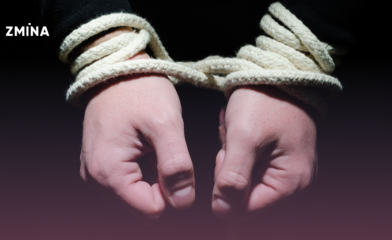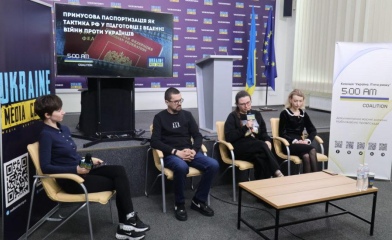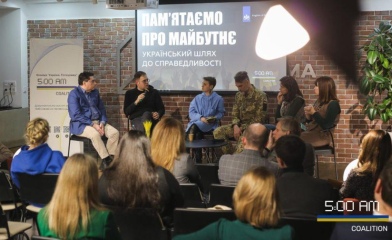How the occupiers turned Crimea into a peninsula of fear and how it lives today were discussed by the participants of the Crimea panel during the media marathon "10 Years of Russian Aggression in Ukraine. The Path to Justice", organised by the coalition "Ukraine. Five in the Morning" coalition. Just on the days when protesters were being shot in the capital of Ukraine in 2014, the first unmarked military appeared in Crimea. This was the beginning of the illegal annexation of the peninsula by the Russian Federation.
In response to the local population's resistance to the occupation, the Russian Federation has developed a large-scale system of persecution in Crimea, which has turned into a well-coordinated repressive mechanism involving many actors over the past decade.
The Head of the Board of the Crimean Human Rights Group, Olga Skrypnyk, said that her organisation had documented 84,000 court hearings in politically motivated cases against Ukrainian citizens, and that 600 judges of the occupation courts were involved in the persecution.
"This is a really large-scale system, and its scale is evidenced by the numbers of people involved. It is important for us to document the facts not only about those who have suffered, but also about those who are directly involved in these persecutions," the human rights activist said.
According to Skrypnyk, there are currently about two hundred political prisoners of the Kremlin. These are Crimeans who disagreed with the Russian occupation, carried out journalistic or human rights activities, or belonged to religious groups persecuted by Russia. Many of them are subjected to torture and do not receive adequate medical care.
In general, for ten years, the Russian military and occupation administrations have never stopped putting pressure on the local population in Crimea. After the full-scale invasion, it has only intensified: the aggressor country does not ignore either adults or children.
 Olga Skrypnyk
Olga Skrypnyk"Children are taught from the first grade that they have to defend 'their state'. By "their state", of course, they mean the Russian Federation. Russia is engaged in daily propaganda of war and service in the armed forces. Since the start of the full-scale invasion, the speed and scale of this policy has increased. Schools are now holding thematic lessons such as "Talking about the important things". Russian servicemen are invited to schools to tell children about the goals of the so-called 'SVO' and encourage children to join actions to support the Russian military," said Maria Sulyalina, head of the Almenda Centre for Civic Education.
Human rights activists note the significant scale of not only the militarisation of Ukrainian children on the temporarily occupied peninsula, but also their illegal displacement.
"After the full-scale invasion, Russia began mass deportations of Ukrainian children and their adoption into Russian families. But it all started in Crimea. At the time of the occupation, about four and a half thousand orphans and children deprived of parental care were in Crimea."Ukraine has no information about the fate of these children: access to the territory is closed," says Mykyta Petrovets, a lawyer at the Regional Human Rights Centre. " We have reasonable grounds to assume that some of these children were entered into Russian registers. This allows them to be adopted by Russian families. For example, about a hundred of these children were adopted by Russian families, and as a result, they were later transferred to the territory of the Russian Federation, to the Trans-Baikal Territory, seven thousand kilometres from Crimea."
The forced passportisation of the local population and the occupiers' attempts to bureaucratise processes in the occupied territories as much as possible create a huge burden on the Ukrainian authorities, in particular due to the lack of an administrative procedure for recognising acts of family status (birth, marriage, death).
"The courts are simply overwhelmed with cases, they do not have sufficient resources. When crimes are committed against a small number of people, it is clear that it is possible to prove these crimes and bring the perpetrators to justice. But when there are tens or hundreds of thousands of victims, let's be realistic. It is impossible to do this within any adequate timeframe," says Oleksiy Tilnenko, Chairman of the Board of CrimeaSOS.
Along with the increase in the number of investigations, human rights activists and lawyers note new opportunities for establishing justice and further prosecution of those who committed war crimes in the occupied Crimea during the ten years of occupation.
 Oleksiy Tilnenko
Oleksiy Tilnenko"Given that many of the crimes committed in Crimea are not only war crimes but also crimes against humanity, we, together with NGOs and international partners, have been cooperating with the International Criminal Court since before 2020. The full-scale invasion has intensified this work," says Vitaliy Secretary, First Deputy Head of the Prosecutor's Office of the Autonomous Republic of Crimea and the city of Sevastopol.- "We are trying to cover as many areas as possible so that the issues of Crimea, offences and war crimes committed in Crimea do not remain only at the national level, but are also assessed by international courts.
According to him, although Russia's full-scale invasion of Ukraine has cut off physical communication with other parts of Ukraine, law enforcement agencies have new opportunities for investigations that did not exist in 2014. In particular, technology companies are helping to find new evidence.
More details are available in the recording of the discussion in Ukrainian and English.



